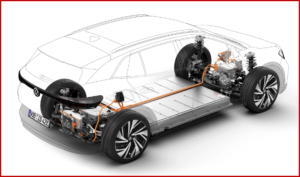The Volkswagen Group has entered into three independent partnerships to enhance its position in batteries, the global warming antidote to petroleum-based fuels. The new partners are the materials technology group Umicore, battery specialist 24M Technologies and Vulcan Energy Resources, which supplies lithium hydroxide. The common goal is mass production of sustainable, innovative batteries, which is also being frantically pursued by all automakers.
“Volkswagen is implementing its battery strategy consistently and at a high pace,” claimed Thomas Schmall, Member of the Board of Management of Volkswagen Group for Technology, and CEO of Volkswagen Group Components. “Volkswagen’s unified cell must be at the forefront of performance, costs and sustainability right from the start. With our new partners, we are one step closer to reaching this goal. Together, we will focus on key parts of the battery value chain and develop innovative technologies.”
Volkswagen AG and Umicore, a supplier clean mobility materials, plan to establish a joint venture designed to supply Volkswagen AG’s European cell factories with cathode materials. For Volkswagen AG, this is the next step to vertical integration of the supply chain. VW is already pursing large-scale, in-house production of the unified cell.
The intention is to gradually ramp up the JV’s production capacity, starting in 2025 with initial production of 20 GWh for the Volkswagen Gigafactory in Salzgitter, Germany. The end game is an annual production capacity of up to 160 GWh by the end of the decade. This is roughly the annual capacity to power 2.2 million battery electric vehicles.
Volkswagen AG is investing in a Cambridge, MA based battery start-up called 24M. It is a spin-off from the Massachusetts Institute of Technology (MIT). The goal is to industrialize the 24M technology, a semi-solid process that is an improvement over the dry coating process in automotive batteries. The aim is to generate cost optimization in future battery production by reducing material usage and eliminating several steps from the conventional production process. For this purpose, a new Volkswagen-owned subsidiary will further develop the technology for automotive applications.
Volkswagen AG and Vulcan Energy Resources Ltd have signed an agreement for the supply of CO2-neutral lithium from the Upper Rhine Valley in Germany. The binding contract centers on providing lithium hydroxide over a period of five years starting in 2026. The product will contribute to securing Volkswagen demand for future in-house cell production both in Germany and Europe. Further aspects of a possible strategic partnership are under negotiation.
Vulcan is currently developing a project to produce CO2 free lithium in the Upper Rhine Valley using a local and lithium-rich geothermal brine. Its Zero Carbon Lithium project aims to establish a sustainable and regional source of lithium from Europe’s largest deposit. The production process does not require fossil fuels or evaporation ponds.



Pingback: Stellantis to be 2nd Largest Shareholder in Vulcan Energy | AutoInformed